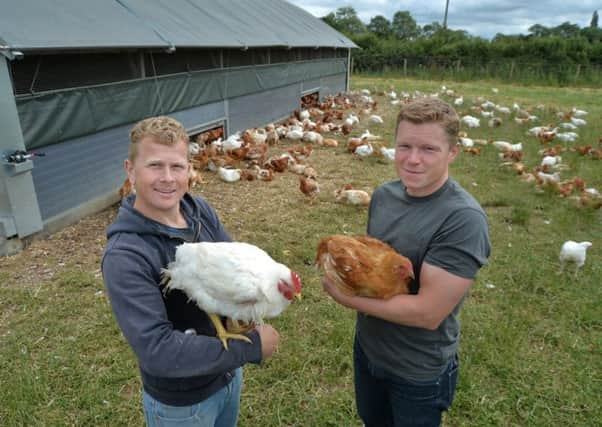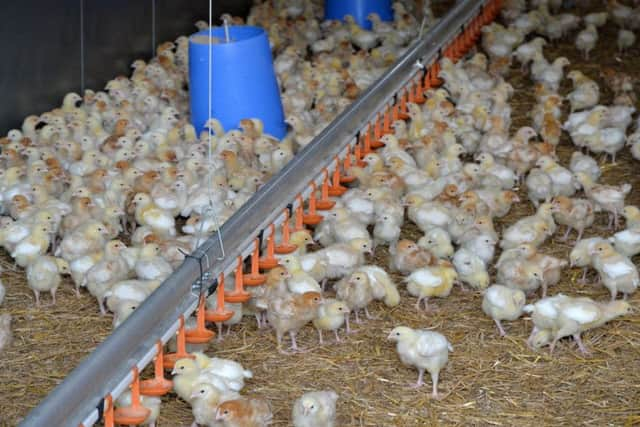How a duo from a Harborough farm reinvented the chicken


Even as a schoolboy keen for extra cash for vinyl records (it was the 1970s), I had to admit it felt a bit... evil.
You patrolled the long sheds of gaunt wire cages, scooping up the eggs that rolled from the tight-packed birds into metal gulleys.
Advertisement
Hide AdAdvertisement
Hide AdThe space allocated for each tattered hen was, I would guess, about the size of a piece of A4 paper.


Bullied birds were pecked almost bald by their aggressive cellmates.
If a hen ever escaped, it was completely bemused. It hobbled, disorientated (if it could walk) until you scooped it up and returned it to its place in the egg-laying production line.
The public wanted cheap eggs, of course, and I wanted weekend money.
Advertisement
Hide AdAdvertisement
Hide AdForty years on, and I’m yomping across a field near North Kilworth, with photographer Andy Carpenter, to see the Fosse Meadows chickens.
Our hosts are Fosse Meadows co-owners Nick Ball and Jacob Sykes – and 18,000 chickens. But the contrast with that 1970s battery farm in Northamptonshire could not be greater.
This farm is 70-acres, for goodness sake, with sheds spread across the site. The sheds are open – birds free to wander across the fields, peck at the clover, rest under the hedges, and return to their roosts in the sheds at night.
The birds even look different – brighter-eyed, athletically longer, more feathersome.
Advertisement
Hide AdAdvertisement
Hide AdThis isn’t actually a wildlife park, of course, it’s still about food production. But it features top-end animal welfare, carefully grown birds and the tastiest chicken possible, rather than cheapest possible.
That’s why The Observer Food Monthly gave Fosse Meadows chicken their seal of approval. It also got an award from Good Housekeeping Magazine.
“Our birds are grown more slowly than most, and for longer says Jacob.
“Our chickens are typically slaughtered at 81 days; commercial chicken is 35 days” adds Nick. “They’re also pesticide free.”
Advertisement
Hide AdAdvertisement
Hide AdAt the moment the chicken sells mainly at 10 different markets in London. Soon the duo plan to prepare their meat in North Kilworth and open a small farm shop.
The two, both now 40, met in 9-5 jobs in London. Nick was a designer, although his family farms; Jacob a property developer. They found they both yearned for their own business and a country lifestyle. The dream led here.
“This certainly isn’t 9-5, but it’s very rewarding” said Jacob. “Me and Nick both enjoy food and we both like an adventure.”
“We saw an opportunity with chicken” says Nick “And the feedback from our customers has been great.
Advertisement
Hide AdAdvertisement
Hide Ad“But we’re not there yet” adds Jacob. “We sell 1,500 chickens a week. We want to get to 4,000 a week.”
The Mail team is given prepared Fosse Meadows chicken to take home. It’s like a different meat; denser and tastier than the chicken we’re used to. The dark meat in particular is a million miles from cheap and – now I think about it – slimey supermarket chicken.
If you’re vegetarian, no sort of chicken welfare is going to pacify you. But even as an uncritical 1970s meat-eater, that battery farm felt like a dark secret: “if customers could see this, they might think twice...”
Today, more carnivores are questioning where their meat is from. If you’re one of those, and you’re prepared to pay extra, Fosse Meadows feels like a more open, friendlier future of farming.